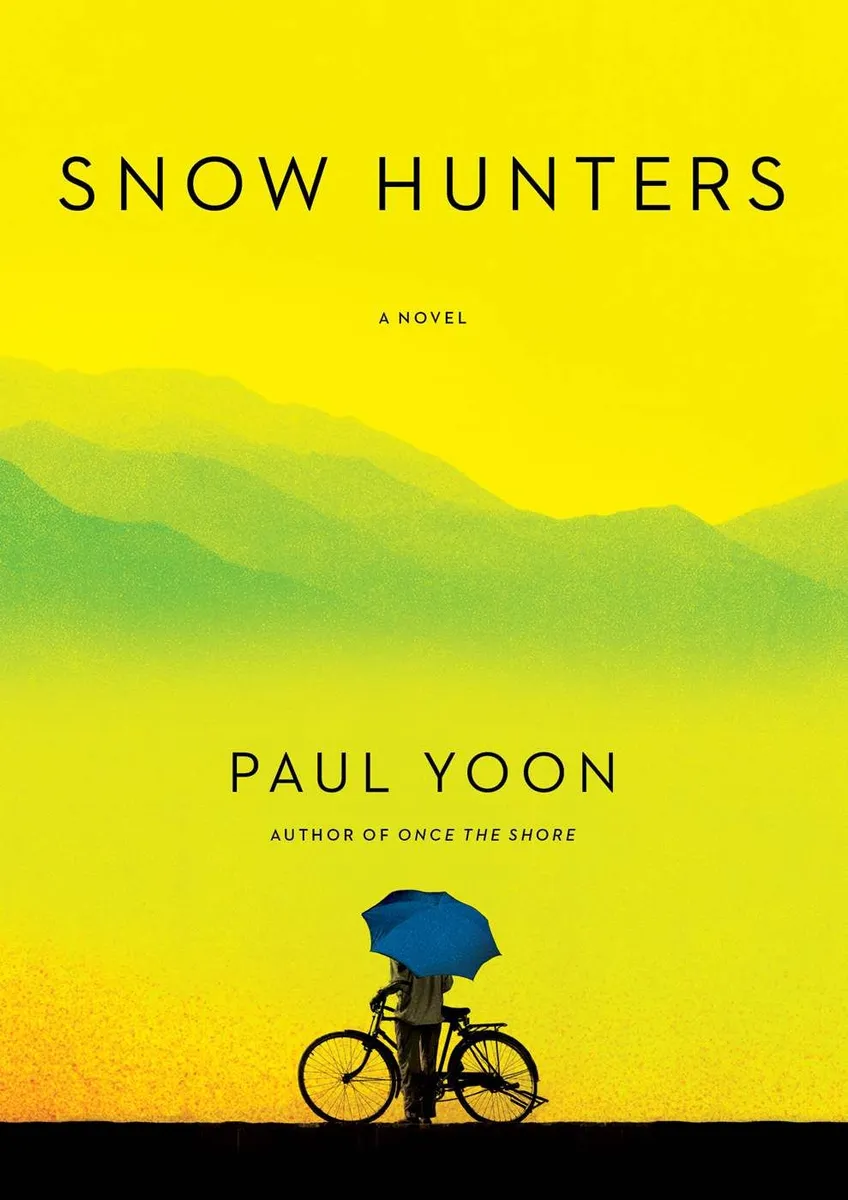Snow Hunters and a Layering of Feeling


Paul Yoon's Snow Hunters is about a man who immigrates from Korea to Brazil after the Korean War. It's quiet and beautiful and intense.
In the passage I want to examine, Yohan is an assistant to a tailor in Brazil—he's safe—but his memories of the years he spent in a camp for prisoners of war come to him vividly between scenes of that calmer present. In the camp, Yohan seems to keep it together by looking out for his childhood friend, Peng, who is blind from his injuries. But sometimes Yohan despairs:
But there were also times when the hours slipped away and he no longer knew how many days had passed. When his mouth grew numb and he lost his sense of taste. When he could not stop shivering in the cold and Peng held him, his body cocooned in a blanket. He listened to the footsteps of the guards and watched the shadows they cast into the cabin, circling the floor and the walls, the slow carousel that would not end. He pressed his forehead against the wall, straining to see a corner of a field, the web of a fence. He longed to listen to a song. To breathe deeply. He grabbed Peng, pushing his hands through what little there was of his hair, as though in search of something. He shouted, waking everyone, until he lost his voice. He ran in place, lifting his legs as high as he could, or turned in circles until he grew dizzy, a delirious energy in his fingers, Peng reaching into the dark and trying to calm him until the guards took him outside and beat him. He lay in the clearing, unable to rise, his body illuminated by the electric lights of the perimeter. He opened his eyes, in that brief moment, the two weapons pointed at him, and felt the unexpected joy of glimpsing the stars.
The experience described is horrifying. Yohan is a prisoner and conditions are terrible. He is beaten so badly he can't get up and his life is threatened by the weapons pressing against him. Of course, the passage contains terror, panic, and pain. Yet there are so many other emotions and feelings that layer in fascinating ways and bring richness, depth, and mystery to the passage. It jumps alive.
First, the memory occurs at a point in the book when we know Yohan has left the camp—at least physically he has. That means while the reader learns of the trauma, we remember his relative comfort and safety, in the now of the book, living a quiet life in a room above a tailor's shop.
Knowing both experiences provides contrast so each feels more extreme. But the book also asks us to hold both in our minds simultaneously, just as Yohan must do. The impossibility of reconciling them creates a sense of paradox and explodes inside the reader's brain to make a deeper experience than one thing at a time.
The creation of paradox through simultaneous opposites happens again and again within the passage.
Inside the memory, just a paragraph before, Yohan was taking care of Peng. That reversal is a layering of opposite experiences—to be the caregiver or the one who needs the care. Yohan is both.
Other details contradict or complicate the terror and despair Yohan feels in the camp. The idea of a carousel, for example, is terrifying due to the context, but in another story the image of would be fun, as would the running, the spinning, and even the dizzy delirium. In different circumstances, Yohan's fingers through Peng's hair would be tender. To be wrapped in a blanket and Peng's arms would mean he was safe and loved.
There are many other contradictions worked into the passage. Yohan shouts and he also loses his voice. His numb mouth is a loss of feeling, while his ceaseless shivering is too much feeling. Running in place gives us frantic energy but no movement, and the repeated mention of circles and spinning emphasizes the sense of going nowhere.
The fence is called a web, which is startling just because it's strange. But also, while a web is menacing, it's delicate and beautiful, too. It makes me think, again, of the previously mentioned cocoon, because it's related to bugs, and because a fly caught in a web looks similar to a cocoon. Together these shroud-like images evoke not only snuggly comfort but death and even rebirth.
Another contradiction comes when Yohan is "unable to rise, his body illuminated by the electric lights of the perimeter." He is inside his body but there is also the sense he is outside of it, seeing it lit up. It's a moment of death and also of the undead in its artificial and electric illumination.
I'm interested in the longing as well. "He longed to listen to a song. To breathe deeply." A longing necessarily creates a ghost in the story. We imagine the song and feel the breathing even though Yohan doesn't get to experience those things. The longing emphasizes what he does not have, but also invites us to imagine both ways--another layer of contradictory circumstances that we must hold next to each other.
Most profound to me, is the final image—the joy of seeing the stars even as weapons are held to him. The idea that beauty can exist and even be appreciated alongside extreme brutality is difficult for a brain to process but pushes the reader to experience something bigger than an ordinary scene.
All of this contradictory imagery—every time we get a detail that is too joyful or too tender or that holds more than one idea at once—and especially the way it all bubbles up at every turn, asks us to hold the idea of Yohan as safe and joyful and loved in the same brain space that we are using to know him as a prisoner, in despair, who is being beaten. The clash of the two realities creates a reading experience that is deep and resonant and gestures to something beyond what can be easily articulated.
One task of a story is to capture what is too complex to state simply, to make the reader feel it instead. Contradiction and paradox can create this sort of mystery and lead us to a different way of knowing. They push us beyond cerebral knowledge and into our bodies to feel something bigger and stranger than we can quite explain.
